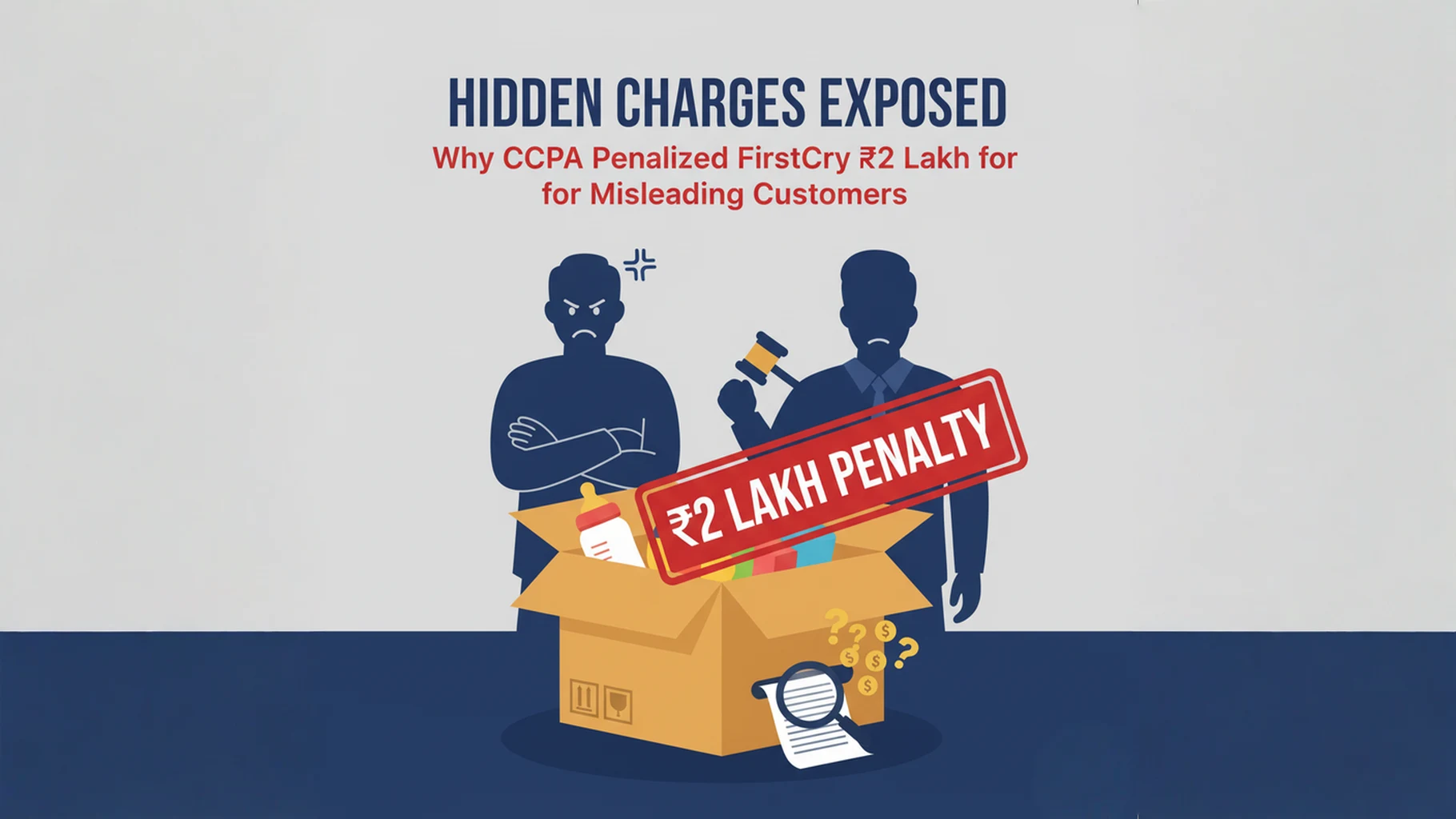New Delhi, September 26, 2025 — The Central Consumer Protection Authority (CCPA) has imposed a penalty of ₹2,00,000 on Digital Age Retail Pvt. Ltd., operator of the e-commerce platform FirstCry, holding it guilty of publishing misleading advertisements and engaging in unfair trade practices.
Background & Consumer Complaint
The action stems from a consumer grievance, further backed by data from the National Consumer Helpline (NCH), alleging that FirstCry displayed product prices with the representation “MRP inclusive of all taxes”, but at checkout, an additional GST amount was imposed on the discounted price.
This practice misled customers into believing that the discount offered was larger than in reality, as the final payable price was higher than advertised.
CCPA’s Findings & Legal Basis
In its investigation, the CCPA concluded that:
- The practice amounted to deceptive pricing and misleading advertising under Section 2(28), and unfair trade practices under Section 2(47) of the Consumer Protection Act, 2019.
- Disclaimers like “additional charges may apply” or “GST and additional charges may apply on the discounted price” did not absolve FirstCry, because statutory norms demand that the MRP must be inclusive of all taxes.
- By advertising a tax-inclusive price and then adding GST at checkout, FirstCry engaged in a “drip pricing” technique — a kind of “dark pattern” — which is prohibited under the Guidelines for Prevention and Regulation of Dark Patterns, 2023.
- This also violated Rule 7(1)(e) of the Consumer Protection (E-Commerce) Rules, 2020, which mandates that the total price (inclusive of all charges and taxes) be displayed upfront.
In quantifying the impact, the authority observed that while the advertisement claimed discounts of around 27 per cent, after adding GST, the effective discount dropped to about 18.2 per cent.
Given the scale of FirstCry’s operations and the likely widespread impact on consumers, the CCPA found the misleading practice to be “significant and widespread.”
Directions & Remedial Order
In its order, the CCPA directed FirstCry to:
- Display both original and discounted prices always as inclusive of all taxes.
- Clearly show any extra charges (such as shipping or convenience fees) separately and prominently.
- Remove any misleading disclaimers that undermine statutory pricing norms.
Following the order, FirstCry made immediate changes on its platform: it introduced a visible disclaimer “price inclusive of all taxes” on all pages of its website and mobile app, and clarified that GST would not be separately charged on discounted prices.
Significance & Industry Implications
This enforcement action underscores the CCPA’s expanding focus on online pricing transparency and its willingness to penalize even large e-commerce players. It signals that regulatory tolerance for “dark patterns,” drip pricing, or hidden tax add-ons is coming to an end.
Consumer rights experts view the penalty as a deterrent. With this order, e-commerce platforms may now give more attention to presenting true and final prices rather than baiting consumers with misleading “discounts.”
The move also aligns with the regulatory push to tighten oversight on digital marketplaces, ensuring that consumer decisions are made with fair information, especially in an era of rising online commerce.
Looking Ahead
While ₹2 lakh may seem modest compared with the scale of e-commerce revenues, the reputational and regulatory impact is meaningful. FirstCry may challenge or appeal the order under the Consumer Protection Act, 2019, possibly before tribunals or higher authorities.
If the company fails to comply or further violations are discovered in the future, stronger actions such as escalating penalties, consumer compensation, or even suspension of advertisements may follow.
Given the evolving regulatory landscape, other e-commerce players will likely re-examine their pricing structures, interfaces, and disclosures to ensure they do not inadvertently run afoul of the law.
Disclaimer: This article is based on information available from public sources. It has not been reported by EQMint journalists. EQMint has compiled and presented the content for informational purposes only and does not guarantee its accuracy or completeness. Readers are advised to verify details independently before relying on them.









